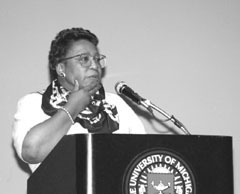The University Record, October 4, 1999 By Mary Jo Frank
Office of Communications

A desire to give shareholders a healthy return on their investments—not altruism—motivates electronics giant Motorola. Inc. to aggressively recruit and promote women and minorities to key management and professional jobs, explains Roberta Gutman.
Gutman, who helped shape Motorola’s successful plan to diversify its workforce so it can excel in a global market, says, “Many organizations will tell you about their key tenets. I look at the leadership. It tells you what they do.”
Gutman gave the keynote speech at a Sept. 30 symposium titled “Contexts for Diversity: Europe and North America.” Dialogues on Diversity, a Universitywide initiative that encourages students, faculty, staff and alumni to explore issues surrounding diversity through open dialogue, sponsored the symposium.
The mother of a U-M graduate student in music and performance voice, Gutman praised Michigan’s commitment to diversity, noting “there is great power in what this University is doing.”
Corporations will find ways to get the talented employees they need, whether that means recruiting at major universities, historically Black colleges or colleges in Puerto Rico, asserted Gutman, Motorola’s corporate vice president and director of global diversity and executive director of the Motorola Foundation.
When she first joined Motorola in 1985, Gutman recalled, she couldn’t understand why the firm, located 30 miles from Chicago, had so few women or people of color in managerial positions. She left a year later, warning Motorola’s management that promoting only white males of Western European descent soon would lead to a shortage of talented employees because of changing racial demographics and decisions by women to leave corporations due to frustrations with the glass ceiling.
Gutman credits George M.C. Fisher for changing the company’s vision after he took over as president in 1988. When Gutman returned to Motorola, Fisher told her, “I want the best minds in the world, trained in what we need, stuck in our doors trying to get in.”
Aggressive leadership at the top of the organization and accountability are key to Motorola’s strategy, Gutman said. The most powerful leaders in the company’s hierarchy were told they had to change the organization to avoid future personnel shortages and would be held accountable for those changes.
“We measure everything we do that we care about,” Gutman said. “At that time companies were not measuring.” While Motorola quietly worked to hire the best and the brightest employees to meet its aggressive hiring goals, other firms were having diversity get-togethers in the company cafeteria, publishing diversity calendars and singing “Kum ba yah,” Gutman said.
Contrary to predictions that dramatically changing hiring practices would polarize Motorola’s workforce, Gutman said, “Nobody left. White guys stay for the same reasons as everyone else—they believe they can do the work and will be rewarded for their work.”
Motorola since has expanded efforts to diversify its workforce to Japan, China, Mexico, Brazil and the United Kingdom, Gutman explained. When she went to Japan in 1993 to work with Nippon Motorola, she was told a Black woman would not be welcome. In fact, she was well received because the people she worked with respected her leadership ability to represent the home office. Nippon Motorola also quickly understood and acted on the need to diversify because of its aging workforce and the country’s low birth rate.
In Mexico and Brazil, she was informed, few women are trained in engineering and computer science. In fact, an informal survey by Motorola personnel found about 40 percent of Mexico’s electrical engineering students are women, Gutman said. One Brazilian told her it will take multinational companies like Motorola to change hiring practices and workplace cultures. “Americans are given a lot of leeway. It is very rare that a country will say you can’t do something,” she noted.
Several years ago she was invited to Stockholm to advise on how to build a diverse workforce. Swedish leaders are concerned that employees who were brought to Sweden from Iran and Turkey to improve Volvo’s productivity have settled in Sweden but do not want to become enmeshed in Swedish society. One Swedish leader told her “the very democracy of Sweden depends on getting this right.”
Gutman publicly thanked her son, Elliot Marshall, for introducing her to the U-M. The reason he gave for wanting to come to Ann Arbor was that “the U-M is the only graduate school of music that has Black men trained at the Metropolitan Opera.”
“Because he was so clear that what he wanted was here,” Gutman recalled, “we started paying attention to Michigan.” Looking at the leadership, Marshall’s parents were impressed when they found Black deans, women department heads and a woman provost.
Gutman congratulated the University and said, on behalf of Motorola, “you can continue to count on our support.”

